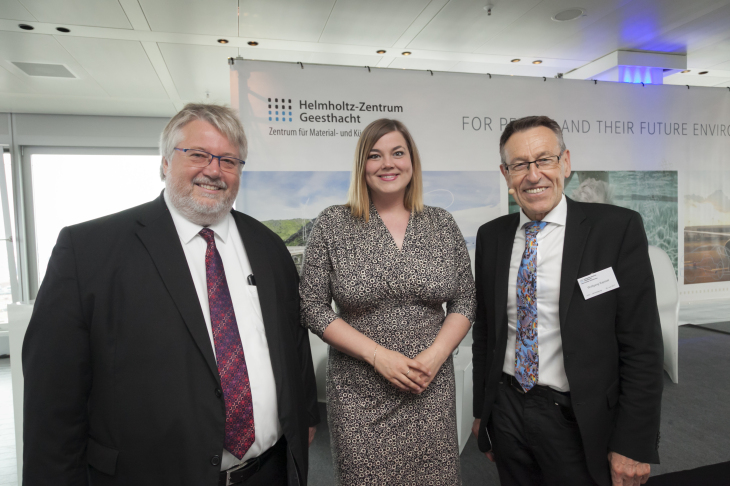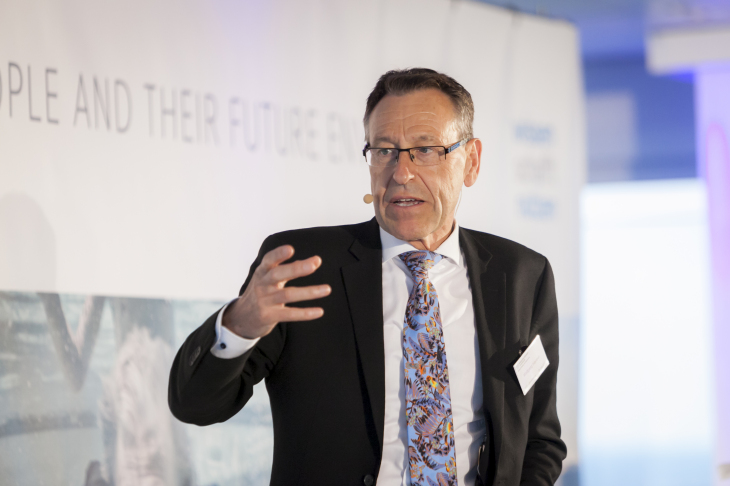Research with a Vision – Real and Digital Viewpoints
The evening of June 29th, 2017, provided a panoramic vision — and not only from the Emporio Tower's 23rd-floor Panorama Deck. The “Research with a Vision” Annual Meeting 2017 hosted approximately 320 guests from the Helmholtz-Zentrum Geesthacht (HZG).

They spoke at the evening: the HZG Supervisory Board Chairman, Undersecretary Dr. Herbert Zeisel (left) and Katharina Fegebank, Science Senator and Second Mayor of the Free and Hanseatic City of Hamburg. Right: The Scientific Director of HZG, Prof. Dr. Wolfgang Kaysser. [Photo: HZG/Janine Martin]
Guest speakers at the annual meeting were the HZG’s Head of the Directorate and manager of “Key Technologies for Growth” at the Federal Ministry for Research and Technology, Undersecretary Dr Herbert Zeisel and Katharina Fegebank, Senator for Science and Deputy Mayor for the city of Hamburg.
Undersecretary Dr Herbert Zeisel explained how humans can perceive reality based on the well-known “Allegory of the Cave” by Plato. Scientists in particular have tried to understand the inner workings of the world. They are able to deepen this understanding more and more through the connection between the real and virtual worlds. HZG assumes a role in forging this connection. The centre is a trendsetter in bridging these two worlds and is not merely a follower.
Science Senator Katharina Fegebank referenced the evening’s motto: “Research with a Vision – Digital and Real Viewpoints”. She mentioned in her introduction that part of the core of the Helmholtz-Zentrum's work lies in handling huge quantities of data.

Scientific director Prof. Dr. Wolfgang Kaysser. [Photo: HZG/Janine Martin]
She is therefore pleased that long-term funding of the German Climate Computing Centre (DKRZ), of which the HZG is a shareholder, has been secured for the coming years. A corresponding declaration has recently been agreed upon between the Helmholtz Association, the Max Planck Society and the city of Hamburg.
![About 320 guest followed the invitation to the annual meeting 2017 [Photo: HZG/Janine Martin] Around 300 guests sat in the hall and listened to the lectures](/imperia/md/images/hzg/presse/news/2017/fittosize__730_0_85dd97aaf75ce464f8109bb6241e17f7_hzg-jahrestagung-2017-178.jpg)
About 320 guest followed the invitation to the annual meeting 2017 [Photo: HZG/Janine Martin]
In the talk, “Research with a Vision at the Helmholtz-Zentrum Geesthacht”, HZG Scientific Director Prof Wolfgang Kaysser presented a further panoramic vision of the centre. He introduced attending guests to climate simulations and current calculations of offshore wind fields that the HZG scientists had created. He also presented predictions of magnesium implant degradation. These predictions were created by the HZG’s material scientists with the help of what is called "neural networks", which consist of a large number of interconnected mathematic functions and can retrieve huge amounts of data.
![Science Talk with materials researcher Dr. Martin Müller (left) student Ewa Christiane Gackenholz (Uni Lüneburg) and coastal researcher Dr. Volker Matthias (right). The talk was moderated by press officer Dr. Torsten Fischer (2nd left). [Photo: HZG/Janine Martin] Science Talk](/imperia/md/images/hzg/presse/news/2017/fittosize__730_0_b55e618425a199d1e247437859b3a958_hzg-jahrestagung-2017-271.jpg)
Science Talk with materials researcher Dr. Martin Müller (left) student Ewa Christiane Gackenholz (Uni Lüneburg) and coastal researcher Dr. Volker Matthias (right). The talk was moderated by press officer Dr. Torsten Fischer (2nd left). [Photo: HZG/Janine Martin]
The Helmholtz scientists discussed digital and virtual laboratories in the closing Science Talk. HZG coastal researcher Dr Volker Matthias and HZG materials scientist Dr Martin Müller as well as graduate student Ewa Christiane Gackenholz (University of Lüneburg) explained in a round table conversation how coastal and material researchers work with large quantities of data and what they learn from it.
After the entertaining and informative speeches, the guests used the evening to chat above the rooftops of Hamburg about research with a vision. They were also able to try out the HZG’s virtual reality (VR) glasses. In addition to watching the “The Hunt for Eddies” movie trailer, users could also experience magnesium research in 360 degrees using the VR glasses.
Contact:
Helmholtz-Zentrum Geesthacht
Max-Planck-Str. 1
21502 Geesthacht
